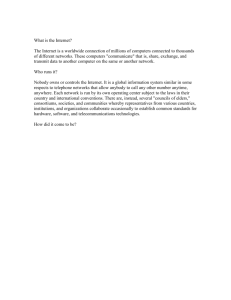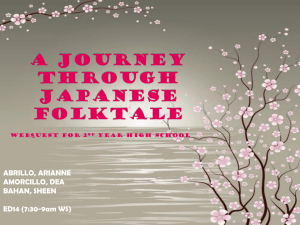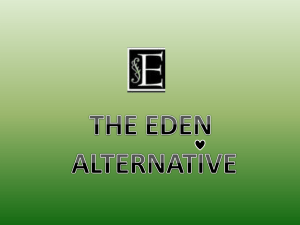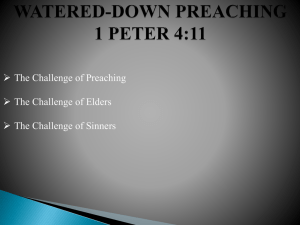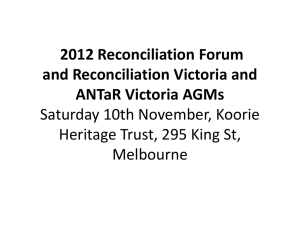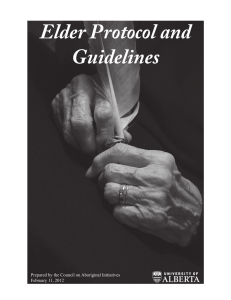Working with Elders presentation
advertisement
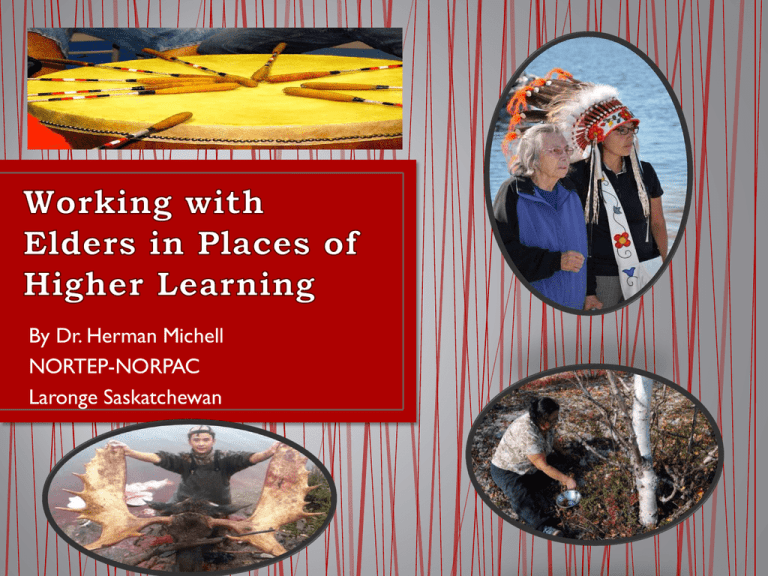
By Dr. Herman Michell NORTEP-NORPAC Laronge Saskatchewan An ‘Elder’ versus an ‘Elderly’ Person Community Sanctioned Definitions are Complex They are visionaries who have survived many struggles….. Cree, Dene, and Metìs people have their own ways of Teaching and Learning Complex Ways of Knowing, Participatory, Inclusive, Sacred & Evolving Teaching, Research, Service, Guest Speakers, Counselors, Professionals THEY HAVE DIFFERENT TYPES OF KNOWLEDGE AND SKILLS Elders Policy Statement – Role within the Organization Basic Principles that will Guide the Elders Office Autonomy of the Office & Impartiality Staffing of Elders & Helpers A List of Services for Faculty & Students PROTOCOLS WHEN WORKING WITH ELDERS Protocols are a Right Way of Doing things…. THE ETHIC OF RECIPROCITY Each community has different protocols for accessing Elders: Offering a gift with symbolic meaning; Offering a pouch of Tobacco; Or a tiny bundle; Offering colored cloth for a particular purpose; Offering a monetary gift for example an honorarium; Offering a blanket with a particular significance; Offering food such moose meat, fish, fowl, berries, wild tea; Offering a service for example doing chores for stories; Other ways that are appropriate; “We Walk on the Dust of our Ancestors” “ALL MY RELATIONS” Cathy Wheaton (Cree) • • • • • • • Diverse Contexts Diverse Ontologies Diverse Epistemologies Diverse Methodologies Diverse Axiologies Diverse Pedagogies Diverse Tools (e.g. Science) There are ‘Sub-cultures within Sub-cultures’ in Aboriginal Communities like any other Society Respect for the natural world is a matter of survival in the north Bridging Western Science & Aboriginal Ways of Knowing Nature Commonalities ‘’Elders and Scientists are trusted practitioners in their own cultures. They exercise rational thought. In addition, scientists demonstrate communal characteristics of teamwork and consensus making, while Elders engage in collaborative discussion and consensus making’’ (Aikenhead & Michell 2011) • • • • • • • • Science is a subset of Euro-Western Culture. Science is a tool for coming to know the natural world People are separate from the World Around them. What counts as Science - Is what can be Measured. Focus on Physical World - Absence of the Sacred Scientific Method - Compartmentalized Knowledge Fragmented Worldview - Linear - Hierarchical Mechanistic - Reductionist - Rational - Impersonal Mathematical idealized - De-Contextualized Exploitative Materialistic - Ideological - Elitist. • NOTE: Not all Europeans subscribe to Western Science • • • • • • • • • • Rooted in Multiple Domains Participatory – Life long – Evolving Contextual & Place-based Inclusive - Cooperative - Peaceful Focus on Natural Laws Respect & Reverence for all Life Reciprocity & Interdependence Balance - Inner & Outer Harmony Sustainable Ways of Thinking and Being ONE CANNOT KNOW ALL THERE IS TO KNOW ABOUT CULTURE IN A LIFE TIME….and certainly not in books…. Clash of Worldviews SCIENCE EDUCATION Saskatchewan Ministry of Education Requires Aboriginal Content Inclusion in All Subject areas; • The main weakness of current research around cultural-based approaches to science education is the lack of quantitative data about how, why, and in what contexts cultural-based approaches are more effective than Western approaches (Cajete, 1999). Enhancing Knowledge Base of Students Resource & Health Sector Vacancies Increased Need for Science Professionals Increased Control of Land & Resources Increased Control of Health Programs Community Infrastructure Development Global Bio-diversity & Sustainable Issues Promotion of Science in Schools & Communities Despite a rich backdrop of cultural traditions, languages, values, practices and holistic ways of connecting with the natural world that could serve as a foundation for scientific learning and achievement... Aboriginal People are chronically under-represented in virtually all fields of science. They lose out on high paying jobs in science & health related fields. Why?…...What’s the Problem? • • • • • • • • • • Systemic Factors - Social/Political/Economic Linked to Colonized Status in Canada Assimilation through Education Euro-centric Schooling Practices & Policies Loss of Culture, languages, values, practices Legacy of Residential Schools – 100 Year Reign Third World Community Conditions Chronic underfunding & Discrimination Lack of Professional Development – Teachers & Profs Lack of Place Based Materials & Resources • • • • • • • Primitive Folklore Static View - Something of the “Past” Irrational & Irrelevant Religious Fear Mongering Evil, Demonic, Witchcraft,Voodoo Worshipping “Other gods” Stereotypes Reinforce ‘otherness’ or that our knowledge is ‘less than’. Teachers are Fearful of Making Mistakes – Or Being scolded – Or Breaking Protocols – Or Whatever…… We live in a world of many cultures, all of which have different standards. It is not necessary to devalue the standards of Western society, except insofar as they claim to be the only worthwhile standards. (Hampton 1995) There are Different Types of ‘Knowledge Keepers’ We are all Gifted in Different Ways We have Many Ways of Passing on Knowledge Teaching Methods Used by Aboriginal Elders Use of Aboriginal Languages; One-on-one Instruction; Experiential – On the Land methods; Hands-on instruction; Watch and Do; Ethic of Non-Interference; Observation, discovery, and inquiry methods; Instruction from the Whole to the Parts; Storytelling, metaphors, and analogies; Ceremony, protocol, and community-mindedness; Apprenticeship and mentoring; Dreaming, imagination, & visualization; Symbolism; artistic creations, craft expressions; Drama, song, dance, and poetic thought; Use of traditional games and competitions; And many other ways…… And Yes they speak English quite well….. OUR NORTHERN ELDERS HAVE SO MUCH TO SHARE Elders have different skill sets Trapper Ways of Knowing – Resonate with Astronomy, Geography, Ecology, Animal Habitats, Bird knowledge, Predicting Weather, Biology, Physics, Chemistry, Mathematics, Plants, Fish and Water Sciences, History….many other areas….. Field Excursions, Short Walks on the Land, Identifying Northern Medicines These can include: Copies of lecture notes, published works, research documents, photographs, power point presentations, invitation letters, cultural objects awarded if appropriate for sharing (for example talking sticks and eagle feathers); cards, thank you letters, course syllabus, proposals, actual minutes, conference proceedings, annual reports, manuals, guides, brochures and media stories, and newspaper clippings. ARTICULATE A SET OF GUIDING CRITERIA for Working with Elders Examples & Best Practices – Every Context will be Different There is no Prescription only Pointers… • Every Context Will Be Different • Every Discipline Will Have Their Own Ways • Every Instructor & Class Will Be Different • Cautionary Note: • Collective Knowledge versus Private Knowledge • Intellectual Property of Aboriginal Communities • • • • • • Community-driven Research The Answers are “Within” Policy Development Long-term Funding Mechanisms Curriculum Renewal Working Closely with Aboriginal Communities • • • • • PARTNERSHIPS – PARTNERSHIPS – PARTNERSHIPS with Industry with Universities with Schools with Governments • Don’t be afraid to make mistakes! • Elders will be humbled that you are willing to Learn…. • Elders will Nourish your Body, Mind, and Spirit…. • Ekosi! Order from: University College of the North Bookstore (204) 627-8544 awadelius@ucn.ca Publisher: Jcharlton Publishing Ltd.


